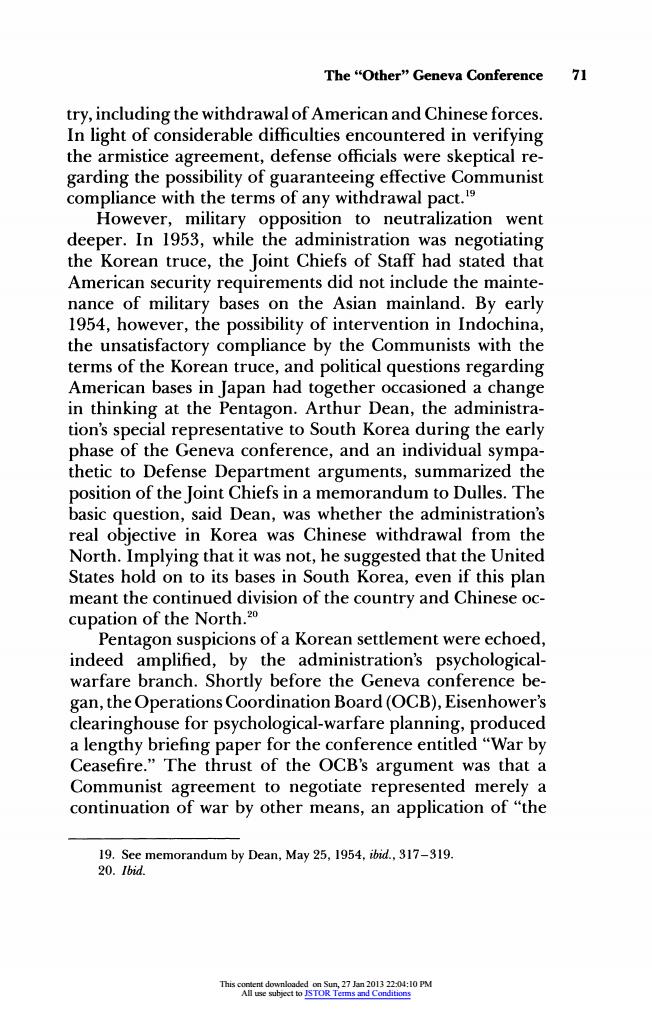正在加载图片...

Thet“Other'”Geneva Conference 71 try,including the withdrawal of American and Chinese forces. In light of considerable difficulties encountered in verifying the armistice agreement,defense officials were skeptical re- garding the possibility of guaranteeing effective Communist compliance with the terms of any withdrawal pact.19 However,military opposition to neutralization went deeper.In 1953,while the administration was negotiating the Korean truce,the Joint Chiefs of Staff had stated that American security requirements did not include the mainte- nance of military bases on the Asian mainland.By early 1954,however,the possibility of intervention in Indochina, the unsatisfactory compliance by the Communists with the terms of the Korean truce,and political questions regarding American bases in Japan had together occasioned a change in thinking at the Pentagon.Arthur Dean,the administra- tion's special representative to South Korea during the early phase of the Geneva conference,and an individual sympa- thetic to Defense Department arguments,summarized the position of the Joint Chiefs in a memorandum to Dulles.The basic question,said Dean,was whether the administration's real objective in Korea was Chinese withdrawal from the North.Implying that it was not,he suggested that the United States hold on to its bases in South Korea,even if this plan meant the continued division of the country and Chinese oc- cupation of the North.20 Pentagon suspicions of a Korean settlement were echoed, indeed amplified,by the administration's psychological- warfare branch.Shortly before the Geneva conference be- gan,the Operations Coordination Board(OCB),Eisenhower's clearinghouse for psychological-warfare planning,produced a lengthy briefing paper for the conference entitled"War by Ceasefire."The thrust of the OCB's argument was that a Communist agreement to negotiate represented merely a continuation of war by other means,an application of"the 19.See memorandum by Dean,May 25,1954,ibid.,317-319. 20.Ibid. This condent downloaded on Sun,27 Jan 2013 22:04:10 PM All use subpect to JSTOR Terms and ConditionsThe "Other" Geneva Conference 71 try, including the withdrawal of American and Chinese forces. In light of considerable difficulties encountered in verifying the armistice agreement, defense officials were skeptical regarding the possibility of guaranteeing effective Communist compliance with the terms of any withdrawal pact.'9 However, military opposition to neutralization went deeper. In 1953, while the administration was negotiating the Korean truce, the Joint Chiefs of Staff had stated that American security requirements did not include the maintenance of military bases on the Asian mainland. By early 1954, however, the possibility of intervention in Indochina, the unsatisfactory compliance by the Communists with the terms of the Korean truce, and political questions regarding American bases in Japan had together occasioned a change in thinking at the Pentagon. Arthur Dean, the administration's special representative to South Korea during the early phase of the Geneva conference, and an individual sympathetic to Defense Department arguments, summarized the position of the Joint Chiefs in a memorandum to Dulles. The basic question, said Dean, was whether the administration's real objective in Korea was Chinese withdrawal from the North. Implying that it was not, he suggested that the United States hold on to its bases in South Korea, even if this plan meant the continued division of the country and Chinese occupation of the North.20 Pentagon suspicions of a Korean settlement were echoed, indeed amplified, by the administration's psychologicalwarfare branch. Shortly before the Geneva conference began, the Operations Coordination Board (OCB), Eisenhower's clearinghouse for psychological-warfare planning, produced a lengthy briefing paper for the conference entitled "War by Ceasefire." The thrust of the OCB's argument was that a Communist agreement to negotiate represented merely a continuation of war by other means, an application of "the 19. See memorandum by Dean, May 25, 1954, ibid., 317-319. 20. Ibid. This content downloaded on Sun, 27 Jan 2013 22:04:10 PM All use subject to JSTOR Terms and Conditions